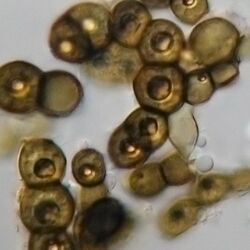Biology:Exophiala
| Exophiala | |
|---|---|

| |
| Exophiala phaeomuriformis | |
| Scientific classification | |
| Kingdom: | |
| Division: | |
| Class: | |
| Order: | |
| Family: | |
| Genus: | Exophiala J.W.Carmich. (1966)
|
| Type species | |
| Exophiala salmonis J.W.Carmich. (1966)
| |
| Synonyms[2] | |
| |
Exophiala is a genus of anamorphic fungi in the family Herpotrichiellaceae. The widespread genus contains 28 species.[3] The genus was formally described by J. W. Carmichael in 1966.[4]
Exophiala has been implicated in causing 'saxophone lung' or hypersensitivity pneumonitis, a disease that can be contracted by woodwind instrumentalists (saxophonists, clarinettists, oboists, etc.). A case study presented at the annual meeting of the American College of Allergy, Asthma and Immunology highlighted that it is possible to develop this allergic pulmonary disease through improper cleaning of instruments.[5][6]
Exophiala werneckii is the organism responsible for tinea nigra.
Some sources equate Hortaea werneckii, Cladosporium werneckii, Exophiala werneckii, and Phaeoannellomyces werneckii.[7]
Exophiala jeanselmei causes maduromycosis.[8] This is usually an asymptomatic disease which presents with black or brown macular lesions which enlarge by peripheral extension. The lesion is darkest at the periphery and has very distinct margins. Lab diagnosis- using a KOH mount. Typically seen is brown septate branching hyphae or dark brown budding cells. Treatment is topical antifungal: miconazole or econazole.
Species
- Exophiala alcalophila
- Exophiala angulospora
- Exophiala attenuata
- Exophiala calicioides
- Exophiala castellanii
- Exophiala dermatitidis
- Exophiala dopicola
- Exophiala exophialae
- Exophiala heteromorpha
- Exophiala hongkongensis
- Exophiala jeanselmei
- Exophiala lecanii-corni
- Exophiala mansonii
- Exophiala mesophila
- Exophiala moniliae
- Exophiala negronii
- Exophiala phaeomuriformis
- Exophiala pisciphila
- Exophiala psychrophila
- Exophiala salmonis
- Exophiala spinifera
- Exophiala werneckii
References
- ↑ "Outline of Ascomycota – 2007". Myconet (Chicago, USA: The Field Museum, Department of Botany) 13: 1–58. December 2007. Archived from the original on 18 March 2009. https://web.archive.org/web/20090318003134/http://www.fieldmuseum.org/myconet/outline.asp.
- ↑ "Exophiala J.W. Carmich. 1966". MycoBank. International Mycological Association. http://www.mycobank.org/MycoTaxo.aspx?Link=T&Rec=8233. Retrieved 27 June 2011.
- ↑ Dictionary of the Fungi (10th ed.). Wallingford, UK: CAB International. 2008. p. 251. ISBN 978-0-85199-826-8.
- ↑ Carmichael JW. (1966). "Cerebral mycetoma of trout due to a Phialophora-like fungus". Sabouraudia 5 (1): 120–3. doi:10.1080/00362176785190211. PMID 6010250.
- ↑ "What Happened When One Man Didn't Clean His Clarinet For More Than 30 Years". Huffington Post. 8 November 2013. http://www.huffingtonpost.com/2013/11/08/saxophone-lung-clean-clarinet-instrument-woodwind_n_4221368.html.
- ↑ "What is Saxophone Lung?". 8 November 2013. http://www.livescience.com/41057-what-is-saxophone-lung-hypersensitivity-pneumonitis.html.
- ↑ "Mycology Online – Phaeoannellomyces". Archived from the original on 5 December 2008. https://web.archive.org/web/20081205080234/http://www.mycology.adelaide.edu.au/Fungal_Descriptions/Hyphomycetes_%28dematiaceous%29/Hortaea/.
- ↑ Exophiala at the US National Library of Medicine Medical Subject Headings (MeSH)
Wikidata ☰ Q5420631 entry
 |
